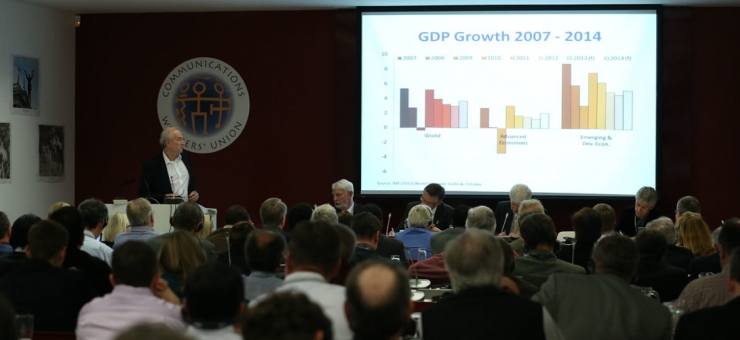Five years on: the financial crisis

Where do we stand five years on from the onset of the global financial crash? That was the question put to a panel of experts in Dublin on the eve of UNI Global Union’s World Executive.
The panel, included Guardian Economics Editor Larry Elliott, ICTU General Secretary David Begg, TUAC General Secretary John Evans, Ieke van den Burg, President of Finance Watch, UNI Global Union General Secretary Philip Jennings and Oliver Roethig, UNI Europa Regional Secretary. They reflected on five years of global mismanagement on jobs, financial regulation, austerity and inequality and offered alternative solutions.
David Begg kicked off the session with a description of the economic situation in Ireland, and why the global recession had hit so hard in the country. He explained why the ICTU had found it necessary to give short shift to the Troika when its representatives visited Ireland recently.
Begg said, “I have never met a group of people (the Troika) ideologically so opposed to compromise or negotiation.”
Roethig added, “The EU Commission and EU leaders adopted a Troika vision of the world and try to dismantle fundamental rights, including collective bargaining, social dialogue, that we fought hard to obtain. We must respect the autonomy of social partners and strengthen social dialogue processes to give back Social Europe its true meaning."
We heard that Europe is continuing business as usual until recovery. This is no longer the case for Social Europe. Both the EU Commission and Member States tell us that we are no longer important.
"Look at what the Troika intervention did in Greece. Neither the government nor the Troika take any responsibility for the dismantling of collective bargaining or the social protection system. Well, the Troika has come to the European level."
"The EU Commission and EU leaders adopted a Troika vision of the world and try to dismantle fundamental rights that we fought hard to obtain. We must respect the autonomy of social partners and strengthen social dialogue processes to give back Social Europe its true meaning."
John Evans examined the state of play at the G20, ILO, and in the global labour market, and highlighted some shocking statistics on inequality, particularly in the United States
“In some countries, 20 per cent and more of long term growth has been captured by the top 1 per cent," Evans said.
“In the US, the top one per cent captured 52 per cent of the total rise in income between 1976 and 2007. 93% of the total rise in income in the United States in 2010 went to the top one per cent. We are back to phenomenally rich people siphoning off large parts of growth.”
Larry Elliott offered ten lessons from the global financial crisis and warned that the union movement needed to offer a viable, positive alternative for future economic systems instead of only focusing on legitimate criticisms of the actions of the right.
Ieke van den Burg looked at the challenges ahead and concluded that banks must be allowed to fail without causing major disruptions in the economy. This means both that deposit holder and taxpayer money must be protected from potential bank failure. Van den Burg added, “We must restore fair competition and improve transparency in the banking sector.”
Rounding off the session, Philip Jennings said that there were alternatives and that UNI had a plan in place built around the themes of Breaking Through and Including You.
Jennings said, “We have a responsibility to this and the next generation. We will not be marginalised, union growth is fundamental to our mission.”
Quoting Jim Larkin,’s famous line, “The Great only appear great because we are on knees,” Jennings said, “we are not on our knees we will continue to rise up and fight for what we believe."

